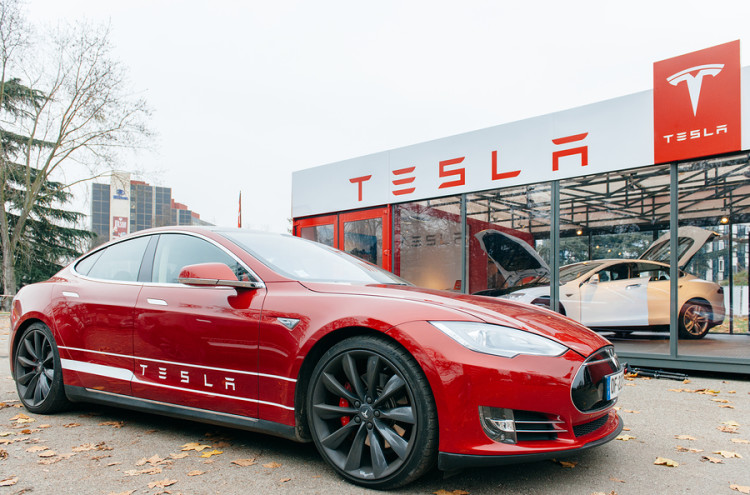Tesla Is Whatever Kind of Company You Want It to Be: Gadfly

published Jun 13th 2017, 2:00 pm, by Liam Denning
(Bloomberg Gadfly) —
The tech tantrum of recent days offered some timely insight into one of the more intriguing, and vexatious, debates in the stock market: namely, whether Tesla Inc. is a car stock or a technology stock.
It’s both, obviously:
In fact, Tesla’s much more of a chameleon than even that chart implies. Far from being just about autos or tech, it is viewed variously as a pioneer in batteries, renewable energy, vehicle autonomy, and ride-sharing (Tesla dropped the “Motors” earlier this year).
It’s true these businesses are becoming ever more integrated. At this point, it’s folly to think of a successful car company of the future being just a car company, as the falling cost of critical technologies such as batteries and sensors — along with the ubiquity of software and changing transportation habits — transform the capabilities and requirements of that thing sitting in your driveway.
Hence, even though Tesla’s sales are a rounding error of those of Ford Motor Co. and General Motors Co., its market cap has raced past theirs, fueled by the vision thing.
This much was reiterated by something that likely helped Tesla buck the tech sell-off on Monday: Morgan Stanley published a report with a curious type of upgrade.
Rather than change the headline target price of $305 a share, analyst Adam Jonas raised the bear-case valuation. Previously $50 — 86 percent below the current price — this is now $175. The reason, according to the report:
We have shifted our bear case valuation from one of asset liquidation/replacement value to one of strategic value.
In other words, at worst, someone eager to get in on the automotive revolution would simply make an offer. Under this thinking, Tesla’s efforts in autonomy and vehicle software, and its head start in gathering data from the thousands of vehicles already on the road, mean that if the price fell low enough, it would be scooped up by a tech firm or a car company seeking an edge.
For how much? Morgan Stanley posits a multiple of 15 times Tesla’s Ebitda in 2019. This represents roughly a 35 percent discount to the multiple Intel Corp. is paying for car-tech firm Mobileye NV. Plus, at $2.4 billion, Morgan Stanley’s forecast of Tesla’s 2019 Ebitda is actually well below the consensus of $3.6 billion, according to data compiled by Bloomberg.
Leave aside that this is what tends to happen over time with financial forecasts for Tesla:
Even if Morgan Stanley’s forecast for 2019 were to prove prescient, its bear case for Tesla still implies someone cutting a check for $36 billion. As bears go, Gentle Ben would look monstrous in comparison.
This isn’t because there’s no chance of someone buying Tesla at some point and at some price in the future. It’s because this new bear case fits with a broader pattern of analysts and others ascribing big values to theoretical outcomes when it comes to justifying Tesla’s share price.
Jonas famously jacked up his price target in 2015 from $280 to $465, largely on the basis that Tesla would launch a successful ride-hailing service. This Tesla Mobility business has since morphed somewhat into Tesla Network, but the point is the same. As Monday’s report said itself, even a successful launch of Tesla’s new car, the Model 3, wouldn’t justify the current valuation. For that, we must resort to scenarios around robo-taxis or, on the downside, $36 billion M&A.
Of 17 analysts with price targets tracked by Bloomberg, only five have one that is above the current price of about $358 (Morgan Stanley’s is $305, a 15 percent discount). In fact, relative to the consensus target, Tesla’s stock trades at its biggest premium in almost four years:
On that note, far from supporting the bull case, this latest sub-upgrade — as opposed to an outright one — perhaps serves to further highlight how stretched Tesla’s valuation, which hit a new all-time high on Tuesday, has become. Equally, though, it reveals the true identity of Tesla’s stock: a repository of dreams.
This column does not necessarily reflect the opinion of Bloomberg LP and its owners.
Liam Denning is a Bloomberg Gadfly columnist covering energy, mining and commodities. He previously was the editor of the Wall Street Journal’s “Heard on the Street” column. Before that, he wrote for the Financial Times’ Lex column. He has also worked as an investment banker and consultant.



No Comment